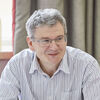
Professor Graham Cook
- Position: Professor of Molecular and Cellular Immunology
- Areas of expertise: human immunology; natural killer cells; cancer immunology; infection and immunity; cancer biology
- Email: G.P.Cook@leeds.ac.uk
- Phone: +44(0)113 343 8411
- Location: 5.13 Wellcome Trust Brenner Building St James's University Hospital
Profile
I lead the Molecular and Cellular Immunology research group and teach immunology to medical students and MSc students.
I studied Microbiology at Imperial College and then moved to the MRC Laboratory of Molecular Biology (LMB) in Cambridge where I studied for a PhD into the mechanisms underlying the cell type-specific expression of immunoglobulin genes. In 1989, I was awarded a Beit Memorial Fellowship and carried out post-doctoral work at the MRC LMB and the MRC Centre for Protein Engineering on the structure and diversity of human immunoglobulin genes and developed techniques to generate transgenic mice expressing human antibody repertoires. In 1996 I was awarded a Wellcome Trust Career Development Award to apply emerging techniques in genomics to study human natural killer cells, working at the Cambridge Institute for Medical Research (CIMR).
During this period, I was a fellow of Selwyn College Cambridge where I taught Molecular and Cellular Biology to Natural Sciences students. I joined the University of Leeds in 2000 as a University Research Fellow in the Molecular Medicine Unit and I am now Professor of Molecular and Cellular Immunology. I have previously served on the British Society for Immunology Forum Group and the Biotechnology and Biological Sciences Research Council (BBSRC) Molecules, Cells and Industrial Biotechnology grant committee. My research group studies human immunity with a focus on natural killer (NK) cells and their role in infection and cancer and the mechanisms by which tumours evade the human immune system.
Responsibilities
- Deputy Director of Institute
Research interests
I am interested in the molecular and cellular mechanisms of human immunity. In particular, my research is focused on understanding the biology of human natural killer (NK) cells and their role in anti-viral and anti-tumour immunity. My research group combines basic research on the mechanisms of NK cell activation with translational studies aimed at exploiting the anti-viral and anti-tumour activity of these cells and of other immune components. Our research involves the analysis of the molecular mechanisms by which human NK cells are regulated by cytokines and other cell types, such as other immune system components or by target cells.
We are investigating the mechanisms and consequences of such activation, for example by defining the cytokines produced by NK cells as a result of tumour cell interactions and studying their action on other tissues, such as immune cells and endothelial cells. A major focus of our research is to define the mechanisms by which tumour cells inhibit NK cells in vivo. We are studying the nature of the signals between tumours and NK cells and attempting to understand their importance in regulating anti-tumour immunity. We perform these studies using model systems in the laboratory (e.g. human cancer cell lines) and using cancer samples from patients. The goal of our studies on NK-tumour interactions is to design and implement therapeutic strategies that will enhance anti-tumour immunity. Recently, we have implemented global approaches to define the immune response to human cancers, focussing on melanoma (in collaboration with Prof Julia Newton-Bishop and Prof Tim Bishop) and glioblastoma. Our goal is to define the many immunosuppressive pathways that operate in human cancer with the aim of targeting these pathways and restoring anti-tumour immunity.
Qualifications
- PhD (MRC Laboratory of Molecular Biology and University of Cambridge)
- BSc (Hons) Microbiology (Imperial College of Science and Technology)
Professional memberships
- Fellow Higher Education Academy
- British Society for Immunology
Student education
I teach immunology and cancer biology to medical students and Master's level students in the School of Medicine and to undergraduate life sciences students in the Faculty of Biological Sciences.
Research groups and institutes
- Leeds Institute of Medical Research at St James's

